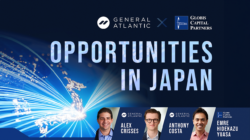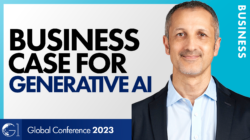Years ago, artificial intelligence, or AI, was firmly in the realm of science fiction. Now, not only is it a real part of our day-to-day lives, but AI-powered systems have a whole host of business applications, including natural language processing and fraud detection. Approaching the adoption of these AI applications will be a key part of business strategy going forward.
Businesses often struggle with new technology, even when they see the necessity for it. Many get stuck in the planning stages as an excuse to not take meaningful action. But this not only holds them back from keeping up—it works against innovation that will push them ahead of the pack.
Dr. Jorge Calvo is deputy dean of GLOBIS University, as well as the academic director of AI business strategy at ESADE Business School. He recently spoke at a GLOBIS USA seminar to discuss the factors of AI technology that he anticipates will have a disruptive impact on the future of business strategy and our everyday lives.
In this video, Clavo introduces the functions and disruptive powers of AI in business and how AI-driven and AI-first companies create new innovations. Below is a transcript of his answers to the questions asked by Yasuyuki Kato, CSO & CFO of GLOBIS USA, during their dialogue session, edited for clarity. Watch the full video above for his keynote speech and audience Q&A.
Why is it important for people in the business world to understand AI technologies?
Dr. Jorge Calvo: We’ll be flattened if we don’t understand. We know this from previous industrial revolutions. If we look at Fortune 500 companies from 1956, only about 18% of the companies remain.
This was because of digitalization and globalization. So we can predict that if companies are unable to adapt and transition, about 40% will have a lot of problems in five or ten years.
I don’t want to be dramatic about this. [We should have] a sense of urgency. We need to have a sense of urgency when we are leading change.
At my company, our president said, “If we don’t transition the company, we will die.” But if we have that mindset, we’ll kill the innovation inside of the company because we’ll move into a reactive, protective mode. And then we’ll fall in the quadrant of these companies that are very good in their core business competencies, but they are not good in new digital competencies. So we need to have a very, very optimistic and positive approach. “Thanks to AI, my company is going to grow two-fold.”
And then the question is how we grow, how we do two times more. With innovation.
Yasuyuki Kato: So maybe without innovation, it’s difficult to survive, looking at the data.
Next Article
How To Leverage Innovation Tech and Transform Your Business
How to Lead with AI Insight
How do you adapt the lessons you learned from AI into updating your business strategy?
Calvo: Companies [try to stay] in their comfort zone. They try to increase revenue by 2% or 5%. Ten percent is very good. But they don’t see that other companies grow by 20%, 30%, or even 100%. So then they’re competing in a different game with different rules.
Changing and transforming a company is difficult because the culture of the company is like an immune system that attacks everything new because they want to protect their legacy. This is human. And this is because we have a gland in our brain, the reptilian gland, that sees change as dangerous, as a risk. And thanks to this, we survive.
But we don’t need to kill the current competencies of the company. Basically, we need three big teams inside of the company. We can classify our talent and our people according to how they can foster these three differing ideas.
The first team’s focus is on how we keep our business alive and growing gradually. Maybe 5 or 10% per year with the current business.
The second team’s focus is how we transform our business to other industries, solutions, or value propositions.
The third team, the moonshot team, looks for very radical solutions and totally different applications.
I’ll give you one example from my company, Roland Corporation. Roland Corporation started in the music field. They invented electronic music, together with other companies. But basically, the electronic drums were created by Ikutaro Kakehashi, the founder of Roland, and the [company’s core competency] was music.
And from that, we were able to jump to computer-aided design and computer-aided manufacturing, digital printers, totally different fields. After that, in the last few years, they jumped to digital dental implants and 3D printing.
But all the businesses remain because of this economy of learning. We can move this knowledge we have from these three differing approaches to the business. And then we can create economies of scope, economies of learning, and economies of scale.
The point is not to kill the core competencies. It’s about how to keep the business alive, and then how we transform the business, and then how we create totally new business.
In this way, we diversify risk. If we fail in the new innovative business creation, we still have the other two areas that are supporting the investment. And then we can fail and learn from the failure, that is very important, but without risk.
What is your advice for people who are trying to start a new business and looking for a competitive advantage?
Calvo: Make your minimum viable proposition clear.
Challenge this minimum viable proposition before going to market by creating a prototype. Then recruit the best talent possible to cover your gaps and help you.
And finally, be persistent, be patient. Try, try, and try.




